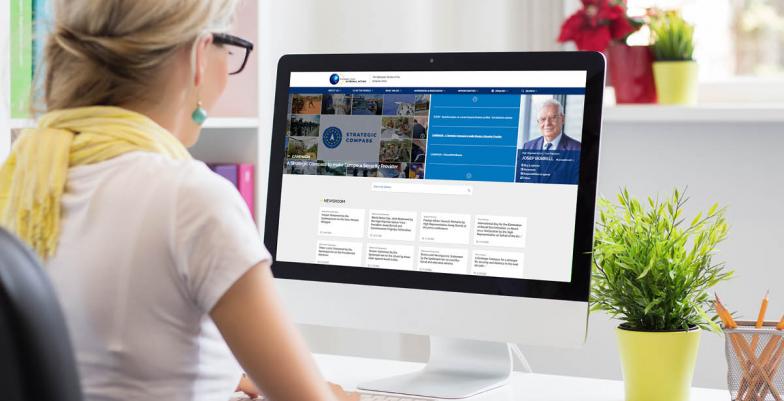Pacific
Working together for a stable and peaceful Pacific region
The EU has a strategic interest in a stable and peaceful Pacific region. The EU is also developing as a security actor in the Pacific. This is increasingly needed in light of the growing geo-strategic competition in the region.
Pacific countries are strong partners in the multilateral rules-based order. The EU is dedicated to working closely with Pacific partners to address global challenges and uphold shared values, such as democracy, human rights, gender equality and the rule of law. We share the conviction that relations between countries and regions must take place within the framework of international law and rules, under the UN system.
In November 2023, the EU and its Member States, and the members of the Organisation of African, Caribbean, and Pacific States (OACPS) signed the Samoa agreement, the overarching framework governing political, economic, and cooperative relations between the EU and African, Caribbean and Pacific countries for the next two decades.
Strengthening bilateral trade through the EU-Pacific EPA
The EU’s trade in goods with the region is covered by the Interim Economic Partnership Agreement (EPA), being applied by Papua New Guinea (PNG), Fiji, Samoa and Solomon Islands respectively. The EU-Pacific trade relations have recently entered a new dynamic era, with more countries joining the Agreement. The accession process of Tonga, Timor-Leste, Niue, Tuvalu and Vanuatu’s are underway.
The EPA – as a self-standing and permanent trade agreement – offers a true partnership and the most generous access to the EU market for trade and investment. The EU-Pacific EPAs have significantly boosted exports, economic growth, entrepreneurship and job creation, with total trade with the EU increasing by 44% since the entry into force of the agreement in 2014.
Supporting sustainable growth through Global Gateway
The EU’s development assistance for the years 2021-2027 amounts to 750 million Euro. In addition, the European Investment Bank (EIB) plays an important role in supporting investments into the region, in line with EU and Pacific countries’ strategic priorities. Over time, the EIB has provided nearly 800 million euro in loans and equity, mobilizing 5.1 billion euro of investment.
The EU is steadfast in its commitment to tackling climate change. The Pacific is one of the regions suffering most from the impacts of climate change, fundamentally unjust as Pacific community contributes less than 0.03% of global CO2 emissions.
Among key initiatives, the EU is supporting the 2050 Strategy for the Blue Pacific Continent. The Team Europe Initiative “Green Blue Alliance for the Pacific” under Global Gateway is a key vehicle for making a reality of our shared vision in the Pacific. It brings together the EU, EU Member States, the European Investment Bank, and the 18 countries and territories of the Pacific region to work on climate action, resilience, and sustainable use of natural capital. It will include, for instance, a project to facilitate and support the increase of hydropower generation capacity in Fiji, helping reduce reliance on fossil fuels and greenhouse gas emissions, and contributing to meet the rising demand for electricity.
Deepening EU-Pacific engagement
The Organisation of African, Caribbean and Pacific States (OACPS)
The Samoa Agreement, signed on 15 November 2023 in Apia (Samoa), is a historic milestone providing a new legal framework for the EU relations with 79 countries that are members of the Organisation of Africa, Caribbean and Pacific States (OACPS) for the next 20 years. It is a mixed Agreement signed by the EU and its Member States, and provisionally applied since 1 January 2024. In the framework of the Samoa agreement, the EU has significant political engagement with the Pacific Island countries (PICs) through regular Partnership Dialogues at Senior Official level. The Pacific Protocol is one out of the three regional protocols of the Samoa Agreement and covers the 15 Pacific OACPS States. It aims to: (1) strengthen political partnership, (2) improve environmental and climate resilience, (3) build democratic, peaceful and rights-based societies, (4) support concrete measures strengthening ocean governance, the conservation and sustainable management of living marine resources including fisheries; and (5) invest in human and social development addressing inequalities. The protocol aims to manage cross border challenges and step-up cooperation with regional mechanisms.
Pacific Islands Forum (PIF)
The Pacific Islands Forum (PIF), founded in 1971, is the main regional organisation of the Pacific, including 14 Pacific Islands Countries (PICs), New Caledonia, French Polynesia, and Australia and New Zealand with a prominent role. The EU has participated in several annual PIF Leaders Meeting’.
Factsheet: EU action in the Pacific











